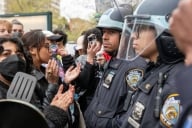You have /5 articles left.
Sign up for a free account or log in.
One subset of the culture wars in higher ed these days concerns the Middle East. Pro-Palestinian activist students regularly organize events that are critical of Israel. Plenty of faculty members criticize Israel. Student groups on some campuses organize in support of academic boycott of Israel. While some student governments have backed the boycott, no American college has actually joined it.
As these debates play out, colleges are regularly described as bad places for Jewish students to be. (Needless to say, Jewish students are far from monolithic on their views of Israel, and some are leaders of pro-Palestinian groups, but the belief persists anyway.)
Many college presidents and admissions deans worry that these quick hits on various colleges may scare away some potential Jewish students (or their parents) and may anger Jewish alumni. When The Wall Street Journal published an op-ed called "Majoring in Anti-Semitism at Vassar," the college responded with an open letter and some Vassar students published articles of their own, disputing the portrayal of their institution as hostile.
So that's why "Admissions Insider" was intrigued by the arrival of a college guide for Jewish students from The Forward, a Jewish publication. "Admissions Insider" (and its parent publication, Inside Higher Ed) are rankings dubious, finding that they oversimplify college choices and de-emphasize the individuality of students. But the arrival of this guide -- and the contrasts between it and the fall guide issued by another Jewish publication (one with decidedly conservative leanings) -- raise questions. Many of the colleges ranked by The Algemeiner as "Worst Campuses for Jewish Students" are on the "best" list assembled by The Forward.
How is this possible? Both publications take into consideration various factors, but The Algemeiner focuses (almost entirely in its campus descriptions) on the presence of anti-Israel groups and what it considers to be anti-Semitic incidents. The Forward includes those factors as well, but also stresses many other factors in its methodology: Jewish organizations, a range of worship opportunities, attendance at Sabbath services, kosher food, Jewish studies programs, Israel study abroad options and more. (There are also criteria that have nothing to do with Jewish or Israel issues -- academic quality, financial aid and so forth.) Both publications penalize colleges where the student government has endorsed the Israel boycott.
But with a broader perspective, The Forward praises colleges that are dinged by The Algemeiner.
Take Columbia University, declared by The Algemeiner to be the worst college for Jews in the United States. Here's the full description of why: "Dozens of anti-Semitic and anti-Israel incidents, including protests and walkouts of events related to the Jewish state, have taken place at Columbia. Pro-Israel students have reported feeling 'very isolated' on campus, in spite of the considerable resources the school has for its large Jewish community. There is a growing coalition of student groups and faculty members at the school voicing support for the BDS movement, and a regular Israel Apartheid Week, led by Students for Justice in Palestine, is held. This year, when Students Supporting Israel decided to respond to SJP with a demonstration of its own, the student government forced it to roll back its reaction. In April, students at the school hosted a speaker from the controversial Israeli group Breaking the Silence, which accuses the [Israeli military] of war crimes. Ultimately, it’s the extraordinarily high number of anti-Jewish incidents and the presence of a constellation of anti-Israel groups on campus that have pushed Columbia to the top of the list."
On The Forward's list, Columbia is ninth best in the country, with a set of facts (admittedly some courtesy of a New York City location) that might make one question how it could be the worst college in America for Jewish students. Among the facts cited in by The Forward: about a quarter of Columbia undergraduates are Jewish, there are seven Israel-related clubs, four Sabbath services every Friday night, 137 synagogues within 10 miles, and multiple kosher food options (including through the university's meal plan).
A Yiddish saying holds that if you ask a question of two Jews, you'll get three opinions. Perhaps that applies to Jewish college guides.








